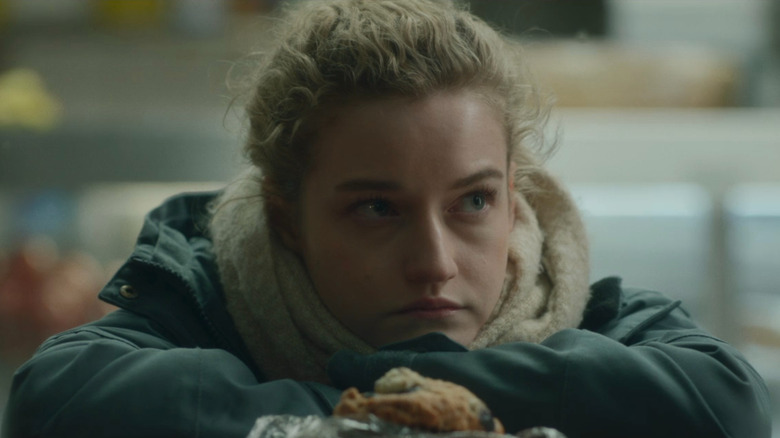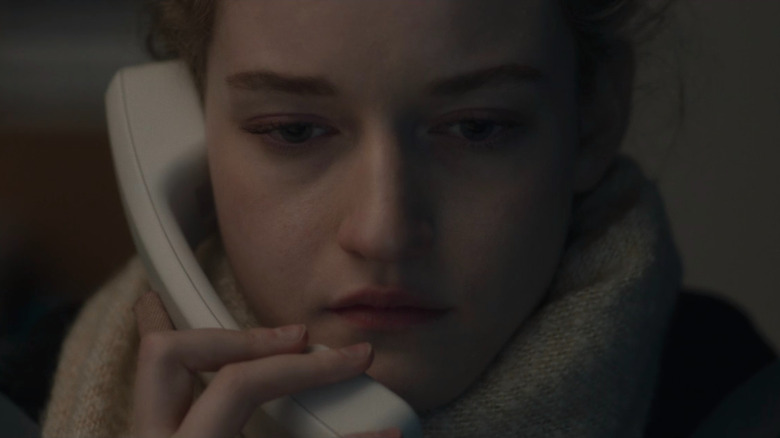Julia Garner Got A Little Creepy During Her Research For The Assistant
One of my last moviegoing experiences before the world shut down was sitting in a completely empty theater to see Kitty Green's first non-documentary feature "The Assistant." I felt incredibly lucky to have this gripping, intimate portrait of an assistant to a horrific, Harvey Weinstein-esque film executive all to myself on the big screen. The film focuses so much on the face of Jane, played by the phenomenal Julia Garner, who has to endure the abuse of various shapes and sizes all around her through what should be a simple day of work. The intimacy of the film, along with my isolation in the theater, created the perfect circumstance for me to immerse myself in this young woman's life. I still firmly believe Garner should have walked away with an Academy Award for Best Actress in a Leading Role for her breathtaking performance that year. No ifs, ands, or buts about it.
Being an assistant is both an incredibly difficult job and a thankless one. People do not think much of someone who spends basically all day on-call to answer phones, run errands, schedule meetings, and so much more. They are not paid well, and in the case of "The Assistant," she is treated like complete garbage by the man she works for. Julia Garner started her acting career as a teenager and has had a pretty steady line of work for a little over a decade now, so she hasn't really had the need to take up a survival job like this before, especially not one this stressful. As with any actor dedicated to their craft, the research process began. But how do you research being an assistant? It's not exactly a profession where a lot of books get written on the subject. Well, Garner's methods were a little unorthodox.
Hit record Julia
A popular form of research for actors is shadowing. Basically, the actor follows someone around for a day or so who actually does the job their character has. This way, the actor can get a better sense on how people in that profession handle certain situations, compose themselves, and interact with their co-workers. Actors love to do this when they play police officers to the point that the concept of a "ride-along" is pretty well known. Julie Garner decided to shadow the assistants for her manager, Dara Gordon of Anonymous Content. She didn't just shadow them, though. She also would record their every move. In an interview with Vogue, writer/director Kitty Green said of Garner's preparation:
"She went to her manager's office and filmed the real-life assistants answering phones and correcting their posture so that she could learn the combination of urgency and calm that they apply to their jobs. She really looked like she knew what she was doing."
Look, it's one thing for someone to watch me work. It would definitely be uncomfortable (especially because I work from home), but I could manage. It's an entirely other thing for someone to film me while I'm working. I am amazed that the assistants she was observing were able to go about their workday being able to function. There's a strong chance I would devolve into a self-conscious mess, and then I could say that I lost my job because Julia Garner freaked me out.
Treat your assistants better
For Julia Garner, this research did prove to be immensely helpful in embodying Jane. In an interview she did with InStyle, Garner noted of her observations of the assistants:
"Every assistant has a certain tone in their voice when they answer a phone call ... There's an urgency — like they have five other calls and need an answer right now — but there's a calmness too."
She completely nails that dichotomy in her performance, particularly in the scenes where her boss is excoriating her over the telephone. She can't snap back, as she would immediately lose her job. You have to seem "professional" even under the worst circumstances possible. Garner goes on to talk about the terrible treatment of assistants, particularly female ones:
"I always knew their job was really hard. Sometimes I'll get an email at 12:30 a.m. and I'm like, 'Go to sleep!' It's a cycle of abuse — even when male assistants gain a little bit of power, they think they can abuse the person in a lesser role, but in the next five minutes, they're getting screamed at too. Just because people are good at their job, they don't have the excuse to behave poorly. Even if it's not sexual harassment, you hear about people throwing hot coffee or muffins at someone."
While people like Harvey Weinstein and Scott Rudin become the poster boys for truly horrific work environments, this behavior towards "low-level" employees crops up everywhere it can if not kept in check. Being dismissive or ungrateful for their work can be as damaging to a person's self worth than anything. So, please, be kind, appreciative, and encouraging of people's assistants, whether they work for you or are communicating with you on behalf of their bosses. They deserve it. After all, they are people too.


